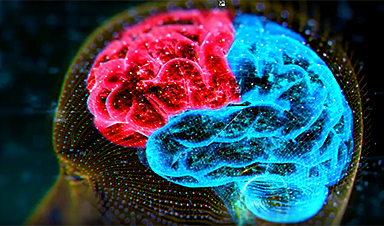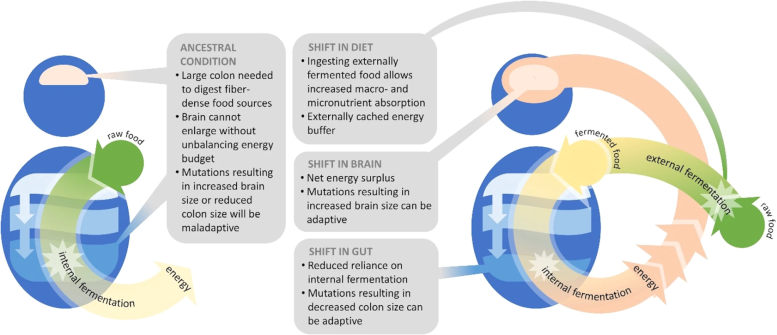The study hypothesizes that ‘pre-digested’ foods contributed to the development of larger brains.
The large, capable human brain is a marvel of evolution, but how it evolved from a smaller primate brain into the creative, complex organ of today is a mystery. Scientists can pinpoint when our evolutionary ancestors evolved larger brains, which roughly tripled in size as human ancestors evolved from the bipedal primates known as Australopithecines.
But why it happened when it did – what spurred that change – has remained elusive. While some have theorized that the use of fire, and the subsequent invention of cooking, gave our ancestors enough nourishment for our larger-brained ancestors to become dominant, a new theory points to a different spark: fermentation.
The Role of Diet in Brain Evolution
The key to understanding how our brains grew is most likely rooted in what – and how – we eat, said Erin Hecht, one of the authors of the study which was recently published in Nature Communications Biology.
“Brain tissue is metabolically expensive,” said the Human Evolutionary Biology assistant professor. “It requires a lot of calories to keep it running, and in most animals, having enough energy just to survive is a constant problem.” For larger-brained Australopiths to survive, therefore, something must have changed in their diet. Theories put forward have included changes in what these human ancestors consumed or, most popularly, that the discovery of cooking allowed them to garner more usable calories from whatever they ate.
But the problem with this theory is that the earliest evidence places the use of fire at approximately 1.5 million years ago – significantly later than the development of the hominid brain. “Our ancestors’ cranial capacity began increasing 2.5 million years ago, which conservatively gives us about a 1-million-year gap in the timeline between brain size increasing and the possible emergence of cooking technology,” explained Katherine L. Bryant, one of the paper’s co-authors and currently a researcher at the Institute for Language, Communication, and the Brain at Aix-Marseille Université in France. “Some other dietary change must have been releasing metabolic constraints on brain size, and fermentation seems like it could fit the bill.”
Added Hecht: “Whatever changed in their diets had to have happened before brains started getting bigger.”
Fermentation: A New Perspective on Brain Growth
She continued, noting that during the last few years, researchers have postulated other options, such as the consumption of rotting meat. In this new paper, Hecht and her team offer a different hypothesis: that cached (or saved) food fermented, and that this “pre-digested” food provided a more accessible form of nourishment, fueling that bigger brain and allowing our larger-brained ancestors to survive and thrive through natural selection.
The shift was probably a happy accident. “This was not necessarily an intentional endeavor,” Hecht posited. “It may have been an accidental side effect of caching food. And maybe, over time, traditions or superstitions could have led to practices that promoted fermentation or made fermentation more stable or more reliable.”
This hypothesis is supported by the fact that the human large intestine is proportionally smaller than that of other primates, suggesting that we adapted to food that was already broken down by the chemical process of fermentation. In addition, fermented foods are found in all cultures and across food groups, from Europe’s wine and cheese to Asia’s soy sauce and natto, or soybeans.
Hecht suggested that an additional study of brain responses to fermented and non-fermented foods might be useful, as might one of olfactory and taste receptors, perhaps using ancient DNA. For the evolutionary biologist, these are all fertile areas for other researchers to pick up on. (Hecht’s focus is more on “how brain circuits have evolved to support complex behaviors” with research on both living humans and dogs.)
As research progresses, Bryant sees possibilities for a wide range of benefits. “This hypothesis also gives us as scientists even more reasons to explore the role of fermented foods on human health and the maintenance of a healthy gut microbiome,” she said. “There have been a number of studies in recent years linking gut microbiome to not only physical but mental health.”
Reference: “Fermentation technology as a driver of human brain expansion” by Katherine L. Bryant, Christi Hansen and Erin E. Hecht, 23 November 2023, Communications Biology.
DOI: 10.1038/s42003-023-05517-3
News
Drug-Coated Neural Implants Reduce Immune Rejection
Summary: A new study shows that coating neural prosthetic implants with the anti-inflammatory drug dexamethasone helps reduce the body’s immune response and scar tissue formation. This strategy enhances the long-term performance and stability of electrodes [...]
Scientists discover cancer-fighting bacteria that ‘soak up’ forever chemicals in the body
A family of healthy bacteria may help 'soak up' toxic forever chemicals in the body, warding off their cancerous effects. Forever chemicals, also known as PFAS (per- and polyfluoroalkyl substances), are toxic chemicals that [...]
Johns Hopkins Researchers Uncover a New Way To Kill Cancer Cells
A new study reveals that blocking ribosomal RNA production rewires cancer cell behavior and could help treat genetically unstable tumors. Researchers at the Johns Hopkins Kimmel Cancer Center and the Department of Radiation Oncology and Molecular [...]
AI matches doctors in mapping lung tumors for radiation therapy
In radiation therapy, precision can save lives. Oncologists must carefully map the size and location of a tumor before delivering high-dose radiation to destroy cancer cells while sparing healthy tissue. But this process, called [...]
Scientists Finally “See” Key Protein That Controls Inflammation
Researchers used advanced microscopy to uncover important protein structures. For the first time, two important protein structures in the human body are being visualized, thanks in part to cutting-edge technology at the University of [...]
AI tool detects 9 types of dementia from a single brain scan
Mayo Clinic researchers have developed a new artificial intelligence (AI) tool that helps clinicians identify brain activity patterns linked to nine types of dementia, including Alzheimer's disease, using a single, widely available scan—a transformative [...]
Is plastic packaging putting more than just food on your plate?
New research reveals that common food packaging and utensils can shed microscopic plastics into our food, prompting urgent calls for stricter testing and updated regulations to protect public health. Beyond microplastics: The analysis intentionally [...]
Aging Spreads Through the Bloodstream
Summary: New research reveals that aging isn’t just a local cellular process—it can spread throughout the body via the bloodstream. A redox-sensitive protein called ReHMGB1, secreted by senescent cells, was found to trigger aging features [...]
AI and nanomedicine find rare biomarkers for prostrate cancer and atherosclerosis
Imagine a stadium packed with 75,000 fans, all wearing green and white jerseys—except one person in a solid green shirt. Finding that person would be tough. That's how hard it is for scientists to [...]
Are Pesticides Breeding the Next Pandemic? Experts Warn of Fungal Superbugs
Fungicides used in agriculture have been linked to an increase in resistance to antifungal drugs in both humans and animals. Fungal infections are on the rise, and two UC Davis infectious disease experts, Dr. George Thompson [...]
Scientists Crack the 500-Million-Year-Old Code That Controls Your Immune System
A collaborative team from Penn Medicine and Penn Engineering has uncovered the mathematical principles behind a 500-million-year-old protein network that determines whether foreign materials are recognized as friend or foe. How does your body [...]
Team discovers how tiny parts of cells stay organized, new insights for blocking cancer growth
A team of international researchers led by scientists at City of Hope provides the most thorough account yet of an elusive target for cancer treatment. Published in Science Advances, the study suggests a complex signaling [...]
Nanomaterials in Ophthalmology: A Review
Eye diseases are becoming more common. In 2020, over 250 million people had mild vision problems, and 295 million experienced moderate to severe ocular conditions. In response, researchers are turning to nanotechnology and nanomaterials—tools that are transforming [...]
Natural Plant Extract Removes up to 90% of Microplastics From Water
Researchers found that natural polymers derived from okra and fenugreek are highly effective at removing microplastics from water. The same sticky substances that make okra slimy and give fenugreek its gel-like texture could help [...]
Instant coffee may damage your eyes, genetic study finds
A new genetic study shows that just one extra cup of instant coffee a day could significantly increase your risk of developing dry AMD, shedding fresh light on how our daily beverage choices may [...]
Nanoneedle patch offers painless alternative to traditional cancer biopsies
A patch containing tens of millions of microscopic nanoneedles could soon replace traditional biopsies, scientists have found. The patch offers a painless and less invasive alternative for millions of patients worldwide who undergo biopsies [...]






















